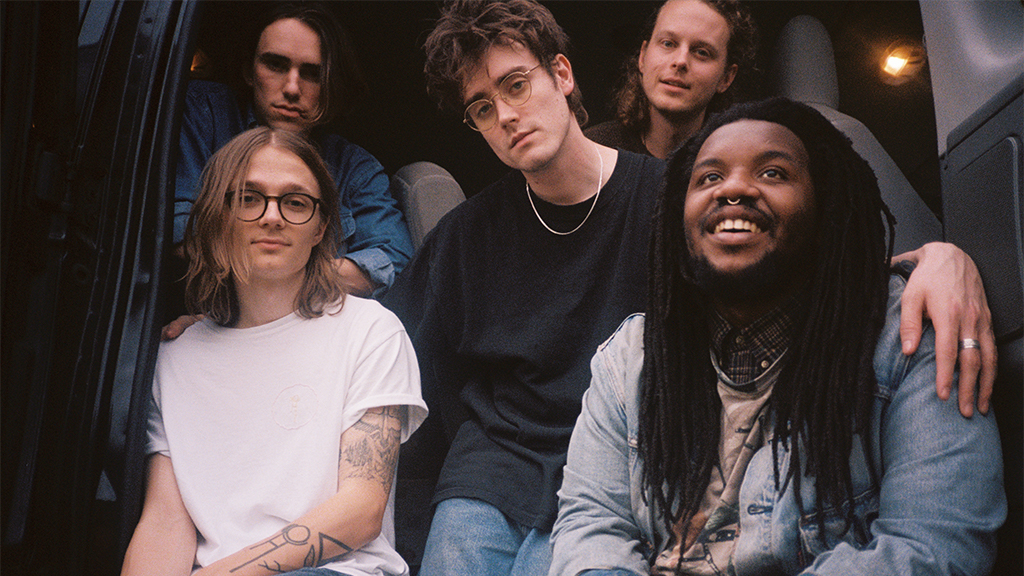
Another Planet Entertainment is committed to producing safe events. Please review our most up-to-date COVID-19 policy requirements for entry on our Health & Safety page.
* Policy is subject to change
This event is all ages.
$29.50 – General Admission Floor
$29.50 – Reserved Balcony
*plus applicable service fees
For an additional $60.00, you can opt in to upgrade your experience to include access to the exclusive Telegraph Room before, during and after the show! Please note all Telegraph Room upgrades are subject to availability.
Join us at The Den one hour before doors for food & drinks!
All doors & show times subject to change.
Hippo Campus
Hippo Campus were sitting in the green room of a sold-out amphitheater show at the start of the Summer of 2023 when they realized they had a major problem. Their fourth LP simply wasn’t good enough. Singer Jake Luppen had been listening to the band’s work as they rolled around the country, trying to tease out how much work remained. All of it, he soon decided. The soul wasn’t there, obfuscated by the need to sound sophisticated and the overwhelming ambition to make the best Hippo Campus LP ever, a deeper and more profound record that reflected how their lives were changing.
They’d committed to that vow with longtime producer and collaborator Caleb Wright a little more than a year earlier, soon after a party where they celebrated the release of LP3. That very night, the call came that a longtime friend had unexpectedly died. They started this band as kids and enjoyed quick momentum, their thrill-a-minute live shows and charismatically experimental pop albums creating almost-instant, avid attention. But this was Hippo Campus’ first close brush with death; as adulthood encroached, the actual call of mortality reminded them of the stakes of art, friendship, and life.
So they committed to doing something major, even if it meant taking five years to do it. They took the task seriously, too: getting sober for an entirely improvisational session at North Carolina’s Drop of Sun months later, regularly attending therapy as a full band, writing more than 100 songs in only a year. That was all well and good, until Luppen and, really, all of Hippo Campus decided they didn’t actually like what they were making. Life and work had been dark in their orbit for a second—death and dejection, addiction and anxiety. This uneasy epiphany wasn’t helping.
So that night, in the dressing room, they called an audible. They were going to start over. Three months later, the four-member core of Hippo Campus rendezvoused with Wright and producer Brad Cook at Sonic Ranch, a playground-like studio complex on the Texas border. They gave themselves 10 days to cut the tracks they liked best, to make something to which they could commit at last. And Cook, in turn, gave them an edict of no second guessing or listening back, only forward momentum. Less than two weeks later, they emerged with what they’d given themselves half a decade to make—Flood, or the best album Hippo Campus has ever made.
You can immediately hear as much in a pair of wondrous songs toward the end, when the love-lost-and-found sing-along “Forget It” fades into the bittersweet and beautiful ache of “Closer,” a gem about trying and maybe failing to surrender your trust to someone else. This is a band that has learned to grow up by learning to let go. When Hippo Campus finally stopped trying to force the issue of making a masterpiece, they tapped intersecting veins of vulnerability and urgency, walking away with 13 tracks that reckon with their uncanny lives through at least that many totally absorbing hooks.
During the last several years, Hippo Campus has had to navigate the tougher wages of success. They are, of course, grateful that a pop band they named on the lark of some psychology lesson blew up, but it certainly eliminated the segue from adolescence to adulthood that most of us enjoy in relative privacy. How could they survive inside and alongside this thing they had created and had outgrown them? And what’s more, how could they endure the vagaries of the music industry, so that they didn’t let a disappointing tour or disspiriting release demoralize them? Or, to ask the cumulative question, how do four people connected so intimately for so long grow as individuals while preserving the bond that makes what they do so special? Or is that actually too much to ask?
For a minute there, the answer seemed possibly like yes. But soon after that improvisational session, the band returned to its own Minneapolis studio and dug in. They stumbled upon “Everything at Once,” with Nathan Stocker’s tricky little guitar lope becoming the basis for the slowly rising rhythm of drummer Whistler Allen and bassist Zach Sutton. Stepping outside for some space, Luppen quickly penned a thesis of self-criticism and self-forgiveness. Being less than the expectations of an industry, a family, or a faith are totally normal, he suggests in an anthem of empowerment that is almost casual. He gives himself the grace of being human: “You gotta lay down sometimes, be patient sometimes,” Luppen sings, layers of lean vocals crisscrossing one another like light beams. “And feel everything at once.”
That is precisely what Hippo Campus do best on Flood—feel everything and transmute it all into songs that are inescapable. Take “Brand New,” three minutes of brilliantly coiled pop, its spring-loaded rhythm lifting a guitar line built from pin pricks skyward. It’s about being ruined by the letdown of a failed relationship and then finding a way forward, toward something so good you haven’t even imagined it yet. It sounds that way, too. There’s the completely compulsive “Tooth Fairy,” a quick-moving meditation on the confusion of interpersonal dynamics. Hippo Campus smear bits of gentle psychedelia around a rhythm, riff, and hook that have the sleek lines of a sports car; the result is a dynamic wonder, a song that feels emphatic at the start but reaches full triumph by the end. Inspired by staring down cycles of addiction too long without taking steps to break them, “Corduroy” finds the space between a bummer country blues and a sweetly devotional waltz. Its vows of love, trust, and doubt are buoyed and also undercut by its slow rises and falls, a musical portrait of trying to take that difficult next step.
The sentiments on Flood are raw, real, and unguarded, a testament to Hippo Campus dropping preconceptions of how they had to sound after so many failed attempts to re-record these songs. They wiped the slate clean, starting over without beliefs about what Hippo Campus or this record needed to be. Still, sophistication lurks in subtle key and tempo changes, in the almost innate shifts that a band of longtime best friends can tap after so much time spent helping to shape one another’s musical language. Flood doesn’t need to tell you it’s important or interesting; it simply is, just by virtue of how it’s written, built, and rendered, a map of what it’s like to feel everything at once. This rebirth is accompanied by a crucial career shift for Hippo Campus, too, as they exit the traditional label system to issue LP4 via Psychic Hotline, a truly independent imprint run by peers and pals. If you’re working to let go of expectations, why not jettison them all? There’s a bravery to that, and you can hear its revivifying spirit in every second of LP4.
Early into the endlessly propulsive “Paranoid,” where stunted acoustic strums undergird an inescapable jangle, Luppen asks an existential question: “Is there something waiting out there for us at the finish line?” For the next three minutes, the band cycles with him through his woes, from the title’s overwhelming worry to notions of dislocation and loneliness. (Also, is there any other refrain ever that manages to make the phrase “so god-damned fucking” sound so catchy and natural?) But in the final verse, with his voice breaking through a scrim of distortion, he stumbles upon a new credo: “Wait, I wanna give this life all that I have in me.” That is precisely what Hippo Campus have done with Flood after realizing it doesn’t take a lifetime—or, well, five years—to do just that.
Ginger Root
A multi-instrumentalist, producer, songwriter, and visual artist from Southern California, Cameron Lew has crafted his Ginger Root project steadily since 2017, inviting a fervent and growing legion of fans into storylines drawn across mediums: captivating albums with accompanying films and globe-spanning tours. The Ginger Root sound — handmade yet immaculately polished synth-pop, alt-disco, boogie, and soul — takes shape through Lew’s lens as an Asian-American growing up enamored by 1970s and ’80s music, specifically the creative and cultural dialogue between Japanese City Pop and its Western counterparts from French Pop to Philly Soul to Ram-era McCartney. SHINBANGUMI, his long-awaited third LP, and Ghostly International debut set for physical release in 2024 with a visual album component, translates roughly to a new season of a show. It finds Lew more poised, idiosyncratic, and intentional than ever in a new chapter of life, unlocking “exactly what Ginger Root should sound and feel like,” he says. “In terms of instrumentation and musicality, it’s the first time that I felt very confident and comfortable with what everything should be comprised of. On the more personal side, I’m coming out of the last four years of writing, touring, and living as a different person; SHINBANGUMI is a platform to showcase my new self.”
Since his first release of “aggressive elevator soul” music and dispatch from his beloved weekly YouTube cover series during college, Lew has captained the ship of Ginger Root, able to write, record, and mix the music while creating the art and videos from scratch. What makes Ginger Root special is the project’s ability to weave influence beyond pastiche into a bigger picture, exploring that rarified pop pleasure center where referential meets refreshing.
In 2018, the project delivered its first album in collaboration with Acrophase Record, Mahjong Room, followed by several projects including the 2020 LP, Rikki. Between each move, Ginger Root has played alongside many modern Indie standouts, such as Khruangbin, Durand Jones, Omar Apollo, The Marias, and Hippo Campus.
With much of Rikki’s release feeling lost to the moments of that year, Lew decided to take a step back and try to write a succinct project to engage listeners for as long as possible. His redirected energy, paired with the newfound influence of Japanese art and culture from his experience learning to speak the language, yielded City Slicker in 2021. On the strength of breakout songs like “Juban District” and “Loretta,” the project connected with a massive audience on the internet, with his YouTube amassing 160,000 subscribers and his Spotify nearly hitting 1 million monthly listeners.
Ginger Root released the Nisemono EP in 2022 and has since played sold-out shows across North America, Europe, and Asia as fans await new music. In 2024, Ginger Root presents SHINBANGUMI across a sequential music video series, resuming the conceptual narrative from his 2022 EP Nisemono, which follows Ginger Root as a newly-fired music supervisor in 1987 starting his own media conglomerate, Ginger Root Productions. “If you watch music videos one through eight, you’ll be presented with a story that’s comparable to a traditional movie; something I’ve always wanted to do.”
